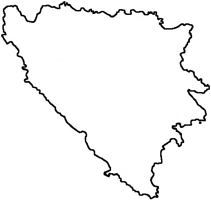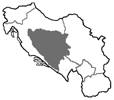
|
The Society of Folk Dance Historians (SFDH) Bosnia-Herzegovina
Home |
About |
Encyclopedia | CLICK AN IMAGE TO ENLARGE |

|
BACKGROUND
Roman, then contended for by Hungary and Byzantium.
Center of mediaeval Bogomil heresy.
Fell to Ottomans in 15th century.
Austrian protectorate in 1878, annexation in 1908, Given to Yugoslavia in 1918.
Rural vs. urban (rather than the less substantial Muslim v. Slav division: Muslim Bosnians are Slavs, and Catholics, Orthodox, and Muslims all live in both urban and rural settings. Rural Muslims have their own music (though they appreciate urban sevdalinke.)
Rural singing: "Mountain Weird Stuff" that Minja teaches, with non-tempered intervals. Actually, na bas style (cadence on a major fifth instead of major second) is increasingly tempered. Accompanied by a violin and a saz / sharkija / sargia in a narrow range, singing in parallel fourths or fifths, with a similar double-stopped playing on the fiddle. Sometimes two violins, sometimes two woman singers and a man sargija player. Said to be a Bosanska Posavina (Sava River valley in northern Bosnia) tradition that spread into the mountains and is practiced by the three major Bosnian ethnic groups: Muslim, Serbian, and Croatian<, with regional rather than ethnic styles.
Urban singing: sevdalinke (songs of sevdah, unrequited love) and similar styles (poravne pjesme – classic broad songs in a ponderously slow 3/4), sung by Muslims, Serbians, Croatians, and Sephardic Jews, founded on Turkish singing with Austrian, Serbian, Croatian and other overlays. Only the saz (with roughly diatonic to roughly chromatic fretting) survived into the 20th cty, accompanied now by violin and accordion-led ensembles, occasionally using tamburitza instruments. Doesn't have the parallel fourths or fifths. Sevdalinke singers: Nada Mamula/Mamoula (husband was Yugoslav Navy ranking officer), Safet Isović, Himzo Polovina (died of cancer), Zaim Imamović, Rade Mladenović, Zehra Deović, Beba Selimović, and Hamid Ragipović-Besko. Older sevdalinke singers (accompanied by saz) are Emina Ahmedhodzić-Zecaj and Avdo Vrabac. After WWII, RTB (Beograd) narodni orchestra director Carevac promoted Bosnian urban music and singers throughout Serbia. Jugoton (Zagreb) recorded the principle Bosnian singers and distributed across Yugoslavi. Many Bosnians worked in Croatia for the standard of living and employment, Bosnian music appeared in Croatian public places.
National Dance: Glamoć
Other name: Bosnia-Hercegovina
Location: Balkans
Regions: Bosnia, originally included the land between the Sava, Drina, and Una rivers.
Language: Bosnian
Religions: Predominantly Muslim
WHY ARE THERE FEW BOSNIAN DANCES IN THE IFD REPERTOIRE?
Few Bosnian teachers and lack of any charismatic Bosnian teacher, although Minja has popularized Bosnian singing, and Ankica Petrović and Mansur Hatić tour.
Unusual music.
Serb and Croat Bosnians comprise the majority of the few Bosnian immigrants to North America, and they prefer the Serb music of RTB and the tamburitza music of the North American Yugoslav immigrant community, a community which fed Vyts Beliajus, Michael Herman, Dick Crum, and John Filcich.
Lack of state-sponsored Bosnian ensembles in the former Yugoslavia.
Establishment of Glamoć as THE Bosnian dance precluded other dances in other state-sponsored ensembles.
Note: "KUD" means Kulturno-umetnička društva (Cultural-Artistic Society), a state-sponsored folk group founded for the preservation of national folk music and dance, as opposed to being for entertainment purposes.
REFERENCES
- Ah, Tečko je umr'jeti, song.
- AMAN's Sarajevo medley: Treskavica Sitna, etc., a dance medley.
- Andjelija vodu n'jela, song.
- Bosansko kolo.
- Bosnian suite by Vaso Popovic.
- Bosno Moja, a fast sevdalinka (urban song), probably the most famous recording is by Nada Mamula.
- Brown, James Duff. Characteristic Songs and Dances of all Nations, ed. with historical notes and a bibliography by James Duff Brown; the music arranged for the pianoforte by Alfred Moffat. London: Bailey & Ferguson, 1901, 1921, 286p. (OCLC 29110039). Includes a Bosnian Dance, p.74.
- Čim si, dušo, vrijeme kratiš, song.
- Crven fesic, a popular song.
- Dolinom se šetala, song.
- Drumovi, a CD by Zhabe i Babe and Ansambl Teodosijevski, Bison Publishing, BP 110857.
- Jarko sunce odskočilo, song.
- Kad Ja Podjoh Na Bembasu, a sevdalinka (urban song).
- Kafu mi draga, a popular song.
- Košutice vodu pile, song.
- Macino kolo.
- Meho Alic, Bosnian dance teacher, a recent immigrant from Sarajevo, former director of UNIS ensemble, Sarajevo.
- Muamar Borgovac, urban Muslim singer, accompanying himself on saz.
- Mujo Kuje, a fast sevdalinka (urban song) popularized by Nada Mamula.
- Ne klepeci nanulama, a popular song.
- Omer beze, a very fast sevdalinka (urban song).
- Pala magla, song.
- Pastirče, mlado i milo, song.
- Pošla cura na vodu, song.
- Silent Kolo/Staro Bosansko Kolo/Glamoć.
- S'one strane Jajce (Plive), a song based on a Sufi ilahi.
- Urban Muslim couple dances from the KUD repertoire, filmed by Lynn.
- U Šest variants by recent Bosnian immigrants.
- U Stambolu, na Bosporu, from: Pjesmom Kroz Našu Domovinu 2. Kršek, Ivan, 1972.
- Zapevala sojka ptica.
- Zeleni se gaj, song.
NATIONAL ANTHEM
|
Zemljo tisucljetna |
I pledge my loyalty to you |
DOCUMENTS
- Balkans, a region.
- Beware of Gift Giving Customs in Foreign Lands, a list.
- Bosnia: Echoes from an endangered world, a compact disk.
- Čarlama, a dance.
- Pop Marinko, a dance.
- Yugoslavia, a former country.
This page © 2018 by Ron Houston.
Please do not copy any part of this page without including this copyright notice.
Please do not copy small portions out of context.
Please do not copy large portions without permission from Ron Houston.
